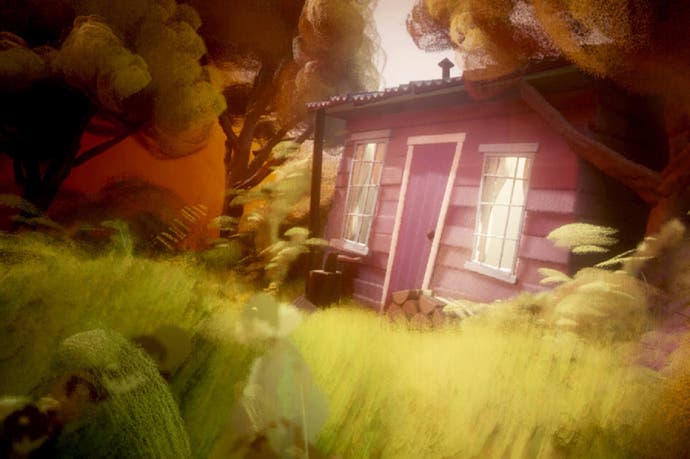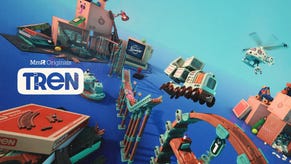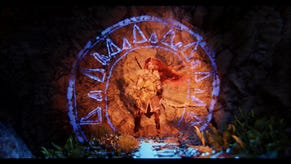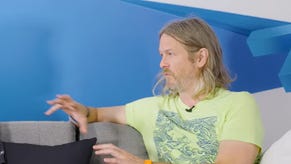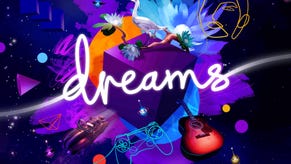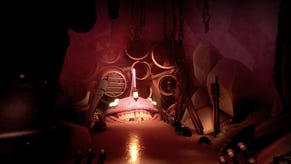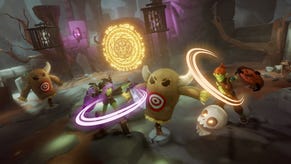Only in Dreams: Addressing the tricky question of what Media Molecule's latest is about
Alex Evans on turning players into developers, and the possibility of micro-publishing.
Here's a question that's become familiar in recent years: what is it you actually do in this game then? Sean Murray of Hello Games, the small studio behind the mind-bogglingly large No Man's Sky, has been fielding it for a while, and now it's the turn of Media Molecule on behalf of its ambitious PlayStation 4 exclusive Dreams. Alex Evans, Dreams' technical director and the studio's co-founder, is something of a veteran in this regard - rewind a few years to a time before LittleBigPlanet's release in 2008, when all there was to go on was a high-minded GDC demo, and it's a question that was being asked regularly. This is a studio with a knack, it seems, for making games that can be impossible to pin down at first sight.
If you wanted to be super reductive, LittleBigPlanet was a bouncy, physics-led platformer at its very core. The short answer this time around? "You explore, you play puzzles, you go on an adventure," Evans explains as we sit cross-legged on the show floor at PlayStation Experience, fresh from taking an hour's guided tour of the creation tools in Dreams, time spent straining a little to see where the game kicks in.
It's the long answer, though, where it gets really interesting.
"I'm really bipolar about this. Catch me on a good day about Dreams - and this was the case with LittleBigPlanet - and you can say this is going to change the world, and we're going all in and truly trying to do something with all our heart and soul, and it is weird and it is risky. But when you get it in your hands it starts to make sense. In my other mood, it's not that complicated. When you start explaining it, it's a tool."
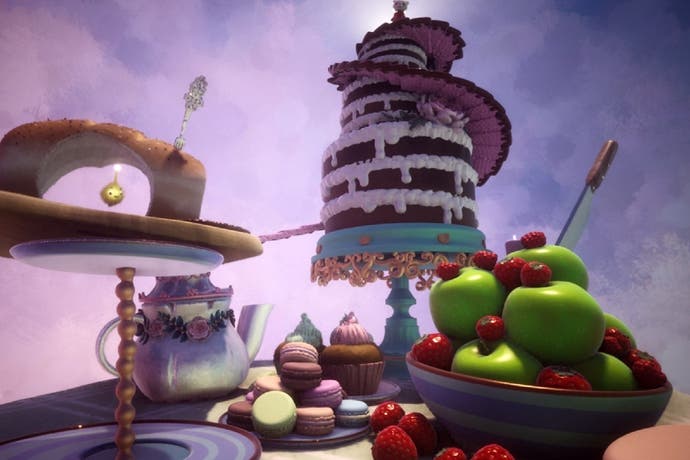
Dreams, fundamentally, is a way to make things; a way to craft and create and refine and collaborate, a lump of wet clay that's waiting, in truth, for everyone else to truly define what it is, and what it will be. What distinguishes it from its predecessor LittleBigPlanet is its expressiveness, and its expansiveness. Watching Kareem Ettouney, Media Molecule's art director, in action can be quite staggering as a doodle blossoms out into a full-blooded creation, an impressionistic toy-like sculpture that's halfway between Giacometti and Jackanory. Listening to Evans afterwards, the possibilities are dizzying, his energy infectious as he sketches out his own vision for the future. It's no wonder there's not an easy answer to hand.
To better understand what Dreams is now, and what it will be, perhaps it's worth going back to the beginning, and to the very genesis of the project. "We wanted to reinvent 'create'," says Evans. "We really did. There was a part of us that thought the process of making games was this path of diminishing returns. Everyone's going down the same path. Unreal is amazing, Unity is amazing, but they all have the same lineage, they have the same vibe and the same tools.
"We were like, what if you took every single aspect of creation - music, sound, sculpture, animation, logic, gameplay, interactivity - and rewound the clock ten years? What if this was sketchy? It's the thing I'm really jealous of as a programmer. Artists have sketchbooks and pencils. They can do something amazing in ten minutes. I want that for game making, and no-one's doing that. The genesis was, 'can we do creation of performance as a sketch?' How do you embrace that looseness? And Dreams was the perfect metaphor to wrap that up. Dreams are a bit weird and loose, it doesn't matter if it's not quite perfect."
Dreams' very origins began as a small sketch itself, an experiment within Media Molecule by programmer Anton Kirczenow with Sony's PlayStation Move controller. At a time when the studio was looking to move away from the fundamentally 2D world of LittleBigPlanet, Kirczenow's experiment led to something of a revelation. "3D on a screen is hard to do well, and suddenly we had this device, and we were like everyone's doing Move wrong," says Evans. "It's this misunderstood stepchild of controllers that's actually incredible, and everyone was doing it wrong. They weren't doing 1:1. And the VR guys do this naturally - everything you've learnt from when you was four years old with motor control, you've got all of that to make levels in. It's mind-blowing when you realise how simple it is."
It's this simplicity that helps make Dreams a more accessible tool than LittleBigPlanet's own creation suite, with an open invitation to experiment rather than a requirement to sit down and patiently engineer something new. It helps that it's more approachable, and while Dreams will be playable with a traditional DualShock 4 controller, and without a PlayStation Eye, it's when using a PlayStation Move controller that it comes to life, Sony's motion wand the perfect substitute for a sculptor's scalpel, a pen or a paintbrush.
"The PlayStation 4 is sitting on all this amazing motion control tech," says Evans. "Every controller has a light bar - you don't need a camera to play Dreams, but if you get the camera you get an extra degree of freedom with your controller, and it works great. In terms of the Move controller, that is sitting there on the PS4 platform, it's the best motion control platform anywhere. Which is a bit bizarre."
How strange, too, to find such a powerful creation being released exclusively on a home console. "I love the fact that PS4 is potentially mass-market," says Evans. "It provides us with this amazing constraint - don't just do a tool, do a game. That's actually a really useful Occam's razor for us - the game has to feel fun to play, [as does] the act of creation. Things like Twitch Creative couldn't have come at a better time. Kareem talks about how the tool has to be fun to watch, in a way that watching someone using 3D Studio Max just isn't. Watching someone sculpt in Dreams is quite cathartic, and quite relaxing."
Indeed, any confusion around Dreams stems from the older generation - and I place myself firmly in that bracket - with the younger audience more familiar with what's involved. When LittleBigPlanet was first being pitched to Sony back in 2006, it was a world before YouTube had become such a phenomenon, and before Minecraft had cast its spell. Dreams will release in an environment where player-driven creation is the norm for so many people.
"I love the fact the world is Twitch streamers and empowered indies," says Evans. "All this stuff is incredible, and what I love about Dreams is we can slot into this world. We don't have to explain it to the younger generation as much as we do our own generation. You meet the younger generation and they expect UGC, and they expect modding - a game comes out on PC and it's modded in 10 seconds. It's part of the culture of gaming now. I love the fact that Dreams can slot into that. It's cool, there's less explaining to do, whereas in LittleBigPlanet we were feeling around for what that meant."
Dreams will be shaped by the world it helped create too, with an enhanced ability to follow tastemakers and creators from within the game's community. It's perfectly conceivable to play Dreams without ever having to create anything yourself, and so powerful are the tools that so much will be possible. "Dreams' ambition is ten times LittleBigPlanet's. Its ambition leaves LittleBigPlanet for dust. That's where it's different. In LittleBig Planet you were assembling stuff we made for you. If you want a matchbox, we gave you a matchbox - screw you if you want anything else. In Dreams you're assembling, all the way down. It's kind of hard to comprehend, because I'm so used to it now."

There's one question, though - given the ubiquity of user-friendly engines such as Unity and, to an extent, Unreal, why would someone choose to invest time in Dreams without the potential to release a financially lucrative game with their final creation? Media Molecule doesn't have a hard and fast answer just yet, but it's working towards one. Creations within Dreams can be exported to Unity, making it a potential part of a developer's toolkit, but there's also the idea that there could be a more self-contained solution too.
"LittleBigPlanet had a Game of the Year edition, and we got ten great creators from the community to make levels on that disc," says Evans. "There's nothing stopping us doing that again. But even more than that we've made sure that the Dreams engine can be attached to content without it being the full original Dreams. I have this dream, Mark [Healey, Media Molecules co-founder] has a dream, where if someone makes something incredible in Dreams, what if we could pluck it out, put a bit of money behind it and localise it and put it on PSN?
"If you could ask me whether we could do that, we've made sure there's no technical barrier for that. Whether or not the publishing business wants to go that route... In the world of indies, with Shahid's group and Adam Boyes' group, Sony are really well set up to be a micro publisher. They're so good with indies. I don't know what the business path will lead us down, but I do know that Dreams would be a great platform to celebrate some great creators. We should totally do it. It's so obvious. How we do it? I don't know. Will we do something? Yes, but I don't want to promise a business model."
It looks like there'll be meaningful, rewarding results from what Dreams can create, but with the emphasis so firmly on create right now it's easy to think of it more as a tool than a game. Evans, however, insists it's still resolutely a game - even if Media Molecule's not willing to show its own hand just yet when it comes to its own creations. "It's definitely a game," he says. "It's a tool as well because that's how we make it, and it's a revolutionary tool. It's a game you can enjoy, just as LittleBigPlanet was. I know you'll be able to boot the game, not have understood the game and not have to care about any of the stuff we're showing and still enjoy yourself. Sit on the sofa, pop the Blu-ray in and have a good time.
"It will be story-led, I imagine - the reason we're not talking about it yet is because it's in pieces at the moment. We think we know what we're going to do, but it's not good enough to show you. Dreams has got to stand as a fun experience. It's got to be a pop culture, console experience. How we do it is going to be innovative, I think."
So, we're back to that well-worn old question. What is it you'll actually do, then? "You explore, you play puzzles, you go on an adventure. What is that adventure? You'll find out soon."
This article is based on a press trip to San Francisco. Sony paid for travel and accommodation.
